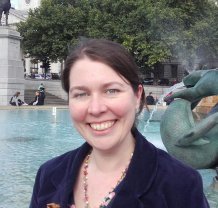Articles

Jenny Durrant (Archaeology, 2003)
Q&A with alumna Jenny Durrant (Archaeology, 2003)
We spoke to alumna Jenny Durrant (Archaeology, 2003) and found out more about her career path and why she volunteers for Exeter.
What do you do and where do you work?
I’m an Assistant Curator at the Royal Albert Memorial Museum & Art Gallery, Exeter (RAMM), where I’m responsible for around half a million objects in the Antiquities collection. This is a very diverse group of objects encompassing archaeology and history – from ancient hand axes to Victorian photographs, classical Cypriot figurines to Egyptian mummies, parts of ancient Exeter buildings to 3D scans of objects.
How did you get into working in your field?
My career route is rather unusual, as I’m still working in the same museum where I began! For a third year module I chose a long placement at RAMM and worked closely with the Antiquities curators, and was offered a part time job when I graduated. Four roles, two sideways moves, and four restructures later I’m still here, and I’ve been in my current role for ten years. But my experience shows how important it is to gain voluntary experience and meet people in your chosen sector – without that initial foot in the door who knows where I would be today.
What is it like working in your role?
The role of museum curators has changed significantly over the last fifteen years, and the work now is extremely diverse. As a multi-award winning museum, RAMM combines heritage, creativity, innovation and quirkiness – and this runs through our daily work. I’m involved in digital projects using the collections, I project lead and create temporary exhibitions, undertake academic research projects with the University, run professional and academic training and teaching sessions, meet the public to identify family heirlooms, and also spend time in store with the collections. Like many jobs, most of my time is spent at my desk with the computer, but with the bonus of creative inspirational colleagues.
What are your top tips for getting into working in your field?
The museum sector is highly competitive due to a massive over-supply of graduates and a shrinking sector. So think widely as there are a huge range of roles other than curator. Top tips: Firstly, you must have museum experience from volunteering, as enthusiasm is not enough. Secondly, you probably need a Masters qualification in museum studies or a heritage subject. Thirdly, join professional networks, get your name known.
And finally, what inspires you to volunteer your time to help Exeter students?
I really enjoyed my time at University and it was because of my practical experience as a student that I discovered my passion for museums. I hope to inspire the next generation of museum people – we need to develop the vision and skills for the museum sector to become sustainable.
Date: 29 March 2018
